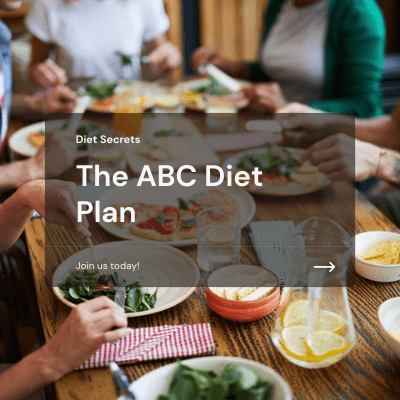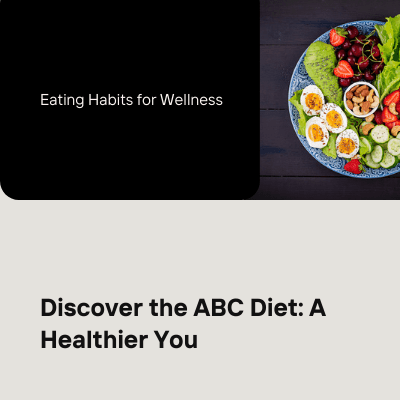The Ultimate Guide to the ABC Diet: Benefits, Risks, and Everything You Need to Know

In the world of dieting and weight loss, the ABC Diet stands out as one of the most controversial and extreme methods. This diet, also known as the Ana Boot Camp Diet, promises rapid weight loss through a highly restrictive calorie intake plan. However, the diet’s extreme nature has raised significant concerns among health professionals. This comprehensive guide will explore the ABC Diet, its benefits and risks, how it works, and whether it’s a safe and sustainable method for weight loss.
What is the ABC Diet?
The ABC Diet, short for Ana Boot Camp Diet, is a highly restrictive diet plan designed to promote rapid weight loss. The diet is known for its extreme calorie restrictions, which vary from day to day over a 50-day period. The primary goal is to create a severe caloric deficit to shed pounds quickly. However, the diet’s intense restrictions can lead to various health risks and are not recommended for long-term use.
Origin and Popularity
The ABC Diet gained popularity in pro-anorexia communities online, where it was often promoted as a way to achieve drastic weight loss. Despite its dangerous approach, the diet has continued to attract attention due to its promise of quick results.
How Does the ABC Diet Work?
The ABC Diet operates on a strict calorie restriction schedule, with daily caloric intake ranging from 0 to 800 calories. The diet alternates between extremely low-calorie days and slightly higher-calorie days to prevent the body from adapting to a consistent low-calorie intake. This approach aims to maximize weight loss by keeping the body’s metabolism from slowing down.
Typical Calorie Schedule
Here is an example of the calorie intake plan for the first 10 days of the ABC Diet:
- Day 1: 500 calories
- Day 2: 500 calories
- Day 3: 300 calories
- Day 4: 400 calories
- Day 5: 100 calories
- Day 6: 200 calories
- Day 7: 300 calories
- Day 8: 400 calories
- Day 9: 500 calories
- Day 10: Fast (0 calories)
This pattern continues for the remaining 40 days, with varying calorie limits each day.
Benefits of the ABC Diet

Rapid Weight Loss
The most apparent benefit of the ABC Diet is rapid weight loss. Due to the severe calorie restrictions, individuals can lose a significant amount of weight in a short period. This can be particularly appealing for those looking to achieve quick results for a specific event or goal.
Psychological Boost
For some individuals, the initial rapid weight loss can provide a psychological boost and a sense of accomplishment. Seeing quick results can be motivating and reinforce the commitment to the diet.
Increased Awareness of Caloric Intake
Following the ABC Diet requires meticulous tracking of calorie intake. This heightened awareness can help individuals become more mindful of their eating habits and the caloric content of different foods.
Risks and Drawbacks of the ABC Diet
Nutritional Deficiencies
One of the most significant risks associated with the ABC Diet is nutritional deficiency. The extreme calorie restrictions make it challenging to consume adequate amounts of essential nutrients, including vitamins, minerals, protein, and healthy fats. Prolonged nutrient deficiencies can lead to severe health issues, such as weakened immune function, anemia, and bone density loss.
Muscle Loss
The ABC Diet’s low-calorie intake can result in muscle loss in addition to fat loss. When the body is deprived of sufficient calories, it may begin to break down muscle tissue for energy. This can lead to a decrease in muscle mass and strength, negatively impacting overall physical fitness.
Metabolic Slowdown
Extreme calorie restriction can cause the body’s metabolism to slow down as it adapts to the lower energy intake. This adaptive response, known as “starvation mode,” can make it harder to lose weight over time and can lead to rapid weight gain once normal eating patterns are resumed.
Psychological Impact
The ABC Diet’s restrictive nature can have severe psychological effects, including anxiety, depression, and an unhealthy relationship with food. The diet’s association with pro-anorexia communities further highlights its potential to contribute to eating disorders and disordered eating behaviors.
Risk of Binge Eating
The cycle of extreme restriction followed by slightly higher calorie days can lead to a pattern of binge eating. The body’s natural response to prolonged calorie deprivation is to seek out food, which can result in overeating and counteract the intended weight loss effects.
Is the ABC Diet Safe?
Given the numerous risks and potential for harm, the ABC Diet is not considered safe by health professionals. The extreme calorie restrictions can lead to serious physical and psychological health issues, and the diet is not sustainable for long-term weight management.
Professional Recommendations
Health experts and dietitians generally advise against the ABC Diet and similar extreme diets. Instead, they recommend balanced, sustainable approaches to weight loss that focus on a combination of healthy eating, regular physical activity, and behavioral changes.
Healthier Alternatives to the ABC Diet
Balanced Diet Plans
Adopting a balanced diet plan that includes a variety of nutrient-dense foods is a healthier and more sustainable approach to weight loss. Some popular and effective balanced diet plans include:
1. Mediterranean Diet
The Mediterranean diet emphasizes whole foods, healthy fats, lean proteins, and plenty of fruits and vegetables. It has been associated with numerous health benefits, including weight loss, improved heart health, and reduced risk of chronic diseases.
2. DASH Diet
The Dietary Approaches to Stop Hypertension (DASH) diet focuses on reducing sodium intake and increasing the consumption of fruits, vegetables, whole grains, and lean proteins. It is designed to improve heart health and promote weight loss.
3. Plant-Based Diet
A plant-based diet prioritizes fruits, vegetables, legumes, nuts, and seeds while minimizing or eliminating animal products. This diet can be highly nutritious and effective for weight loss when well-planned to ensure adequate protein and nutrient intake.
Mindful Eating
Practicing mindful eating involves paying attention to hunger and fullness cues, eating slowly, and savoring each bite. This approach can help individuals develop a healthier relationship with food, reduce overeating, and promote sustainable weight loss.
Regular Physical Activity
Incorporating regular physical activity into a weight loss plan is crucial for long-term success. Exercise helps to burn calories, build muscle, and improve overall health. A combination of cardiovascular exercise, strength training, and flexibility exercises is recommended for optimal results.
Seeking Professional Guidance
Working with a registered dietitian or healthcare professional can provide personalized guidance and support for achieving weight loss goals. Professionals can help create a balanced, nutrient-rich eating plan tailored to individual needs and preferences.
Tips for Safe and Effective Weight Loss
1. Set Realistic Goals
Setting realistic, achievable weight loss goals is essential for long-term success. Aim to lose 1-2 pounds per week, which is considered a safe and sustainable rate of weight loss.
2. Focus on Nutrient-Dense Foods
Choose foods that are rich in nutrients but relatively low in calories, such as fruits, vegetables, whole grains, lean proteins, and healthy fats. These foods can help you feel full and satisfied while providing essential nutrients for overall health.
3. Stay Hydrated
Drinking plenty of water is crucial for overall health and can support weight loss by helping to control hunger and maintain proper bodily functions. Aim to drink at least 8 cups of water per day.
4. Get Enough Sleep
Adequate sleep is essential for weight loss and overall health. Lack of sleep can disrupt hormones that regulate hunger and appetite, leading to increased calorie intake and weight gain. Aim for 7-9 hours of sleep per night.
5. Monitor Progress
Keeping track of your food intake, physical activity, and weight loss progress can help you stay accountable and make necessary adjustments to your plan. Use a journal, app, or other tracking tools to monitor your progress.
6. Stay Consistent
Consistency is key to achieving and maintaining weight loss. Stick to your eating and exercise plan, even when progress seems slow. Remember that sustainable weight loss takes time and effort.
Conclusion
The ABC Diet, with its promise of rapid weight loss through extreme calorie restriction, has gained attention for both its potential results and significant risks. While the diet may lead to quick weight loss, the numerous health risks and potential for long-term harm make it an unsafe and unsustainable approach.
Health professionals recommend balanced, nutrient-dense diets, regular physical activity, and mindful eating as healthier alternatives for weight loss. By focusing on sustainable habits and seeking professional guidance, individuals can achieve their weight loss goals in a safe and effective manner.


